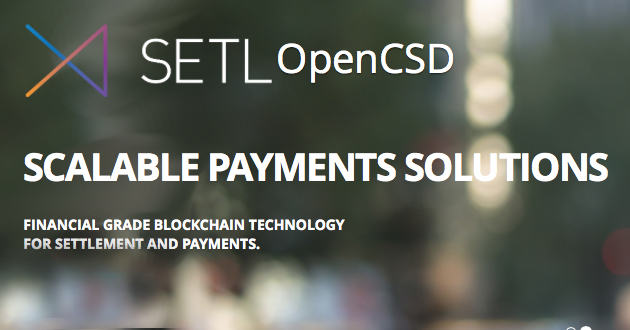The Blockchain-based fintech company SETL has just announced its OpenCSD platform based on federated distributed ledger technology. The start up reveals its permissioned blockchain platform will perform as a digital registry allowing payments, settlement and the clearing of various assets.
When legacy financial institutions trade with each other often the process is slow and cumbersome. Traditional assets such as equities, bonds, loans, and other forms of exchange often can take three days or more to settle. SETL and its CEO Peter Randall want to change the archaic means of trade used today with its OpenCSD platform powered by the company’s blockchain technology. SETL’s digital ledger protocol claims to “settle billions of transactions a day in real-time” racing past traditional settlement models found today. Peter Randall said of the announcement:
“The time has come to stop talking about the characteristics of blockchain and to start realising its promise. Our OpenCSD platform will revolutionise the way securities depositories and payments systems are organised. A group of participants can now permission a working blockchain platform in a matter of minutes and jointly record and settle changes in ownership. This will help bring competition into a segment of financial markets which has thus far been dominated by quasi-monopolistic incumbents.”
SETL has been quite busy adding to its staff and has received quite a bit of funding so far as well. The Financial Times reported last year the firm has raised an undisclosed amount roughly between £20 million and £30 million. Randall wouldn’t confirm the exact number but told Business Insider it was somewhere in that ballpark. The team has also acquired the former executive director of the Bank of England Sir David Walker as Chairman of the firm’s board.
With SETL’s new OpenCSD technology it has been built to collaborate with regulatory policies including the European CSDR, but considers the protocol “jurisdictionally agnostic.” SETL says the OpenCSD platform also adds “organisational functionality on top of the SETL blockchain engine.” SETL’s blog says the protocol is made up of four foundations:
1) a permissioned membership structure
2) a range of control functions including clearing, settlement, and corporate actions
3) liquidity functionality including collateral and repo facilities; and
4) a secure messaging system which can be used to transmit ISO messages as well as enable bespoke communications between participants in a highly secure environment.
The service will also have secure access to identity solutions such as the Legal Entity Identifier (LEI) system. However, the firm states in some particular jurisdictions institutions will require regulatory approval from their local government. The company says the platform will enable a wide array of exchange between traditional trading institutions and individuals. Alongside this, a broad range of assets can be traded as the program is “asset neutral” and can work with many types finance settlements. Randall, added:
“The OpenCSD platform heralds a new era of interoperability, efficiency and flexibility for issuers and asset owners alike, to collaborate and establish their own settlement destinations. It is a means for market participants to empower themselves and to design services around their own needs and cost expectations. We envisage service providers plugging into these projects to provide facilities such as issuer support, payments, and valuation. We expect to work with a number of companies in these areas to support these initiatives.”
With its latest release, SETL plans to revolutionize traditional settlement and use its blockchain engine to do so. The company believes billions can be saved with the use of distributed ledgers by cutting certain intermediaries and unneeded costs out of the equation. The SETL OpenCSD platform is only available on a “subscription basis” and will be taking on a “limited” amount of subscribers during its initial “roll out phase.”
SOURCE: SETL blog



